
How to Unlock iPhone 14 Pro Passcode Screen? | Dr.fone

How to Unlock Apple iPhone 14 Pro Passcode Screen?
Apple offers numerous ways to protect users’ iPhone data from other people, such as Face ID, Touch ID, and screen passcode. Screen passcode has its own significance. Usually, it comes to adoption if your Face ID and Touch ID may not work. In other cases, if you restart your device, and didn’t unlock it for 48 hours, or reset it, you may require to unlock your device through a screen passcode.
What would happen if you accidentally forgot your Apple iPhone 14 Pro screen passcode? After entering it about 5 times, your Apple iPhone 14 Pro will get locked for a few minutes with a message on top. It usually gets frustrating when you cannot unlock it with your screen passcode.
This article comes up with different resolutions and techniques for unlocking your Apple iPhone 14 Pro. Go through the methods to figure out how you can bypass iPhone screen passcode with ease.
Part 1: Unlock iPhone Passcode Screen by Screen Unlock
You might be anxious if you have locked your Apple iPhone 14 Pro and forgotten the passcode. However, there is no need to worry, Dr.Fone - Screen Unlock is here at your service. The tool handles the Apple iPhone 14 Pro passcode screen problem and removes it effortlessly. The user doesn’t need any technical knowledge beforehand to use the tool.
Dr.Fone - Screen Unlock (iOS)
Unlock iPhone Passcode Screen.
- Completely compatible with different lock screens to get you out of the problem.
- It helps the iOS user bypass iPhone passcode and iCloud activation locks
- If you have forgotten your Apple ID password, Dr.Fone Screen Unlock enables you to unlock your phone and log into a new account in seconds.
- Dr.Fone also helps the user bypass the MDM to access the Apple iPhone 14 Pro device effectively.
3981454 people have downloaded it
Step-by-Step Guide to Bypass iPhone Lock Screen
If you are unfamiliar with using the Screen Unlock feature to get rid of the problem, allow us to walk you through the procedure.
Step 1: Launch Wondershare Dr.Fone
First, download and launch Dr.Fone – Screen Unlock on the computer. Then, click on “Screen Unlock” from the interface. After that, connect your iOS device to the system via lightning cable.

Step 2: Booting the Apple iPhone 14 Pro device
Tap on “Unlock iOS Screen” afterward. Now, Follow the on-screen instructions to boot your phone in Recovery or DFU mode. If you cannot activate the recovery mode, click the button line to work on the DFU mode.
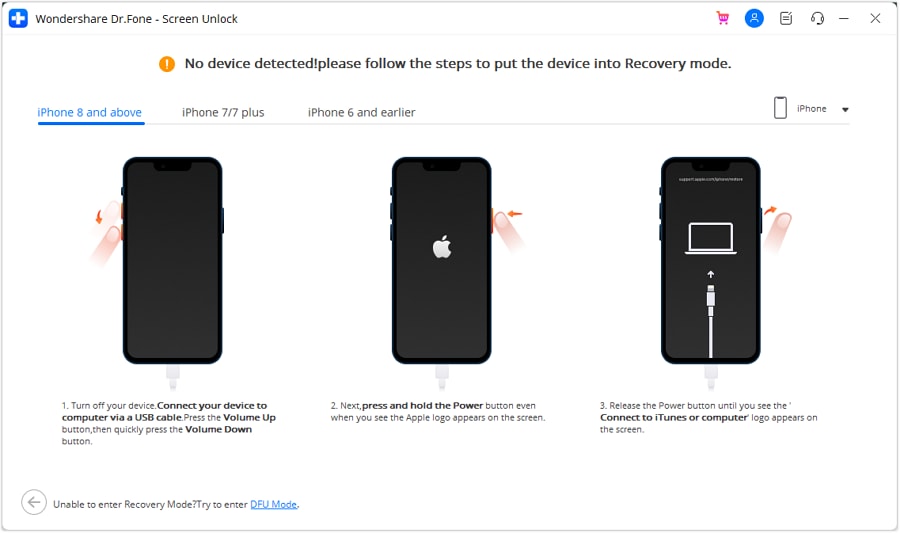
Step 3: Unlocking the iPhone/iPad
After the DFU mode is activated, confirm the Apple iPhone 14 Pro device information, and click on “Download.” After it is downloaded, tap on “Unlock Now.”
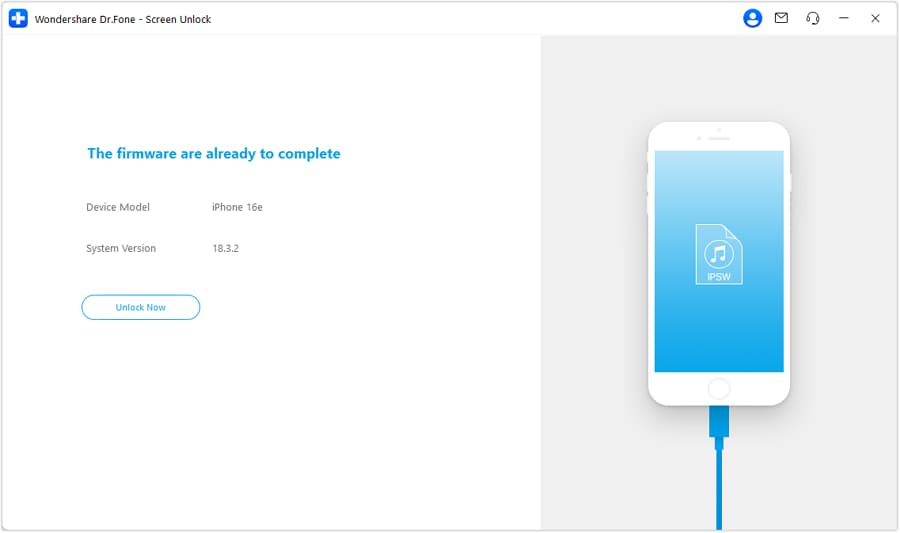
Step 4: Device Unlocked Successfully
After the DFU mode is activated, confirm the Apple iPhone 14 Pro device information, and click on “Download.” After it is downloaded, tap on “Unlock Now.”

Part 2: How to Remove iPhone Screen Lock Using the Recovery Mode
There are other ways to unlock screen passcode. For starters, you can consider resolving this issue using the Recovery mode. It is a troubleshooting operation that lets iTunes fix the issue and erase the old passcode. Follow the procedure below vividly:
Step 1: Connecting Process
The first step is to connect the Apple iPhone 14 Pro to computer and then launch iTunes. Force restart the phone after the phone is connected.
Step 2: Activating the Recovery Mode
There are different ways to activate the Recovery mode based on your Apple iPhone 14 Pro models.
- Press and release the Volume Up button if you are on iPhone 13/12/11/XS/XR/X/8 or iPhone 8 Plus. Again, press and release the Volume Down button. Now, press and hold the Side button to activate the Recovery Mode.
- Similarly, if you are an iPhone 7 or iPhone 7 Plus user, press and hold the Volume Down and Side button simultaneously until the Recovery Mode screen doesn’t show.
- Suppose you own an iPhone 6S or earlier, an iPad, or iPod Touch. Press and hold the Home button and the Side buttons. Until the Recovery Mode enables, you need to hold these buttons off.
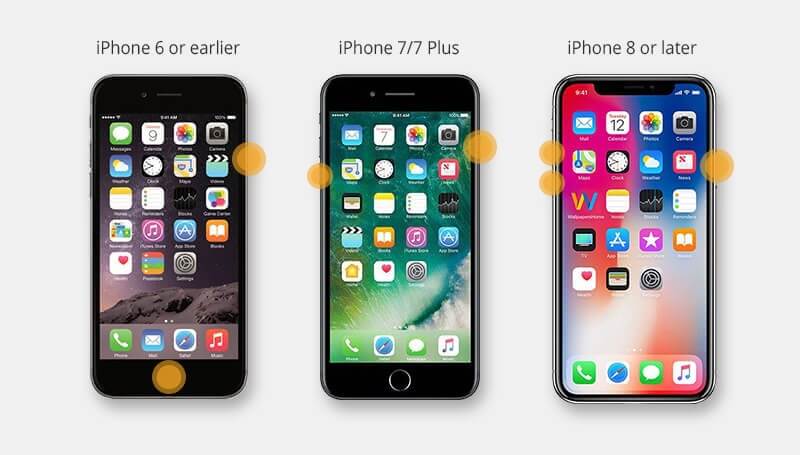
Step 3: Restoring Process
Click on Restore, and iTunes will download the software for the Apple iPhone 14 Pro device after the process is concluded, set up your Apple iPhone 14 Pro.
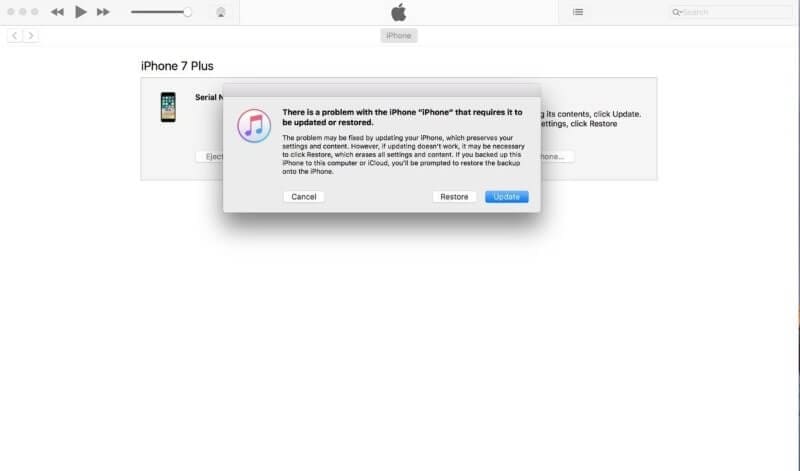
Pros
- The Apple iPhone 14 Pro is restored to the previous settings, and all messages and emails will be retrieved.
- There is no damage attached with using the Recovery mode to bypass iPhone lock screen.
Cons
- All the data will be lost and erased.
- The non-iTunes app such as music will be lost.
Part 3: How to Unlock iPhone without Screen Passcode Via iCloud
Another viable method to solve the problem is to erase your Apple iPhone 14 Pro with iCloud and remove the passcode. Following are the detailed steps:
Step 1: Signing In
Open iCloud.com on your computer and sign with your Apple ID. All the Apple iPhone 14 Pro devices that are linked with your Apple account will appear.
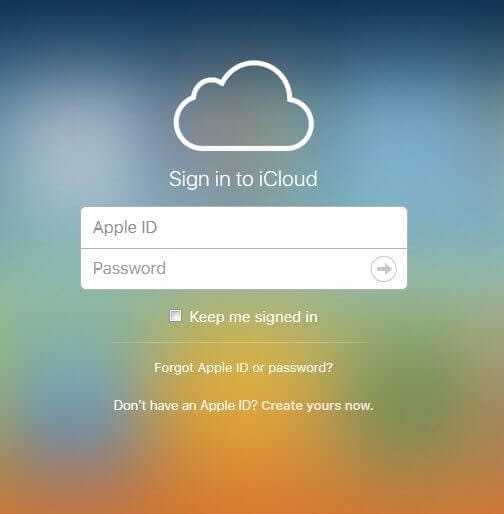
Step 2: Erasing iPhone
Click on the Apple iPhone 14 Pro device that needs to be removed. Then click on “Erase iPhone”. Now, you can restore the Apple iPhone 14 Pro from the backup or set up a new one.
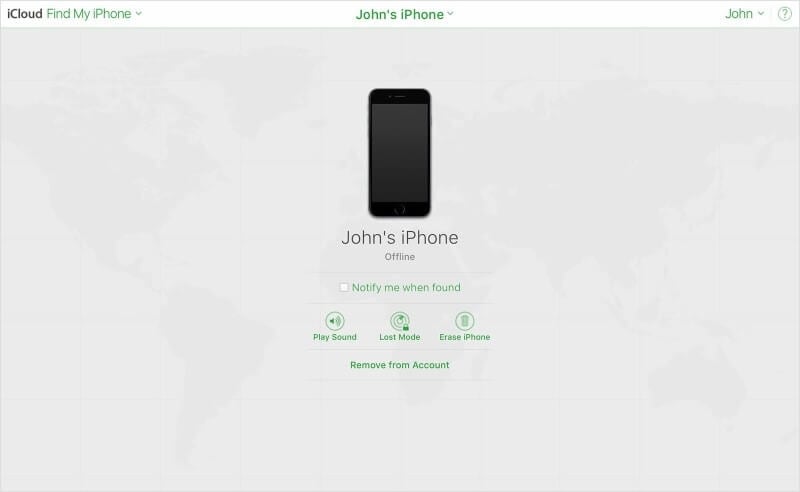
Pros
- The user is free to access all the Apple iPhone 14 Pro devices through iCloud, whether iPad, iPhone, or iPod.
- The location of the lost device can also be tracked effortlessly.
Cons
- One cannot access iCloud without an Apple ID.
- If your iCloud is hacked, your data becomes a liability for them and can be erased at any time.
Part 4: How to Unlock iPhone without Passcode Via Find My iPhone
You can also consider unlocking your Apple iPhone 14 Pro through Find My iPhone. This platform is suitable for many cases where you can find the distance of your device from yourself with its last recorded location. You can also use it to access and control all the data across your Apple iPhone 14 Pro. To unlock your device with this method, you need to:
Step 1: Launch the Find My application on your secondary iPhone and log in with your Apple ID credentials. Click on “Sign In” and proceed.
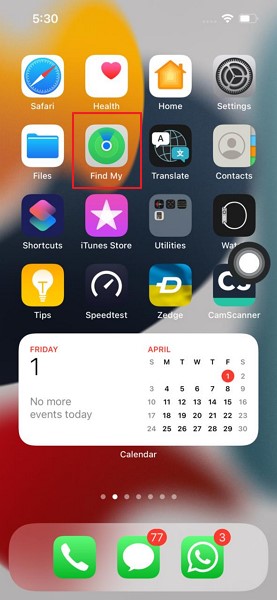
Step 2: You need to select the “Devices” tab and locate your device in the list. After finding the Apple iPhone 14 Pro device, scroll down and click on the “Erase This Device” button.
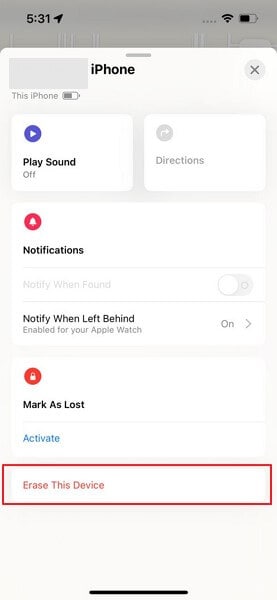
Step 3: A confirmation message will be provided where you need to tap “Continue” to proceed. When that particular device connects to the internet, the data across it will start to delete automatically.
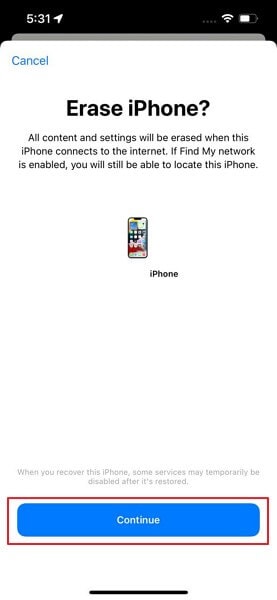
Pros
- On activating Lost Mode, you will be notified of the availability of the Apple iPhone 14 Pro device’s location. Your Apple iPhone 14 Pro and data will be protected and will not be accessed until provided with the Activation Lock and screen passcode.
- Using this platform, you can manage all your devices, such as Apple Watch and MacBook.
Cons
- Your device needs to be connected to the internet to be erased.
- If you do not remember your Apple ID and password, it would be impossible for you to reactivate the Apple iPhone 14 Pro device.
Part 5: How to Bypass iPhone Lock Screen Using Siri
If you do not have any potential source for unlocking your Apple iPhone 14 Pro, you can consider using Siri for this purpose. Here are the steps to bypass the Apple iPhone 14 Pro lock screen using Siri.
Step 1: You need to activate Siri on your Apple iPhone 14 Pro. Keep holding the Home button or Side button according to your Apple iPhone 14 Pro model for activating it. When activated, speak “What time is it” to it.
Step 2: Siri will display the time with a clock icon on the front. Click on the icon to open the associated interface. Click on the “+” icon and proceed to the next screen. You will find a search box on the next screen. Type random characters and hold the tab until it shows the option of “Select All.”
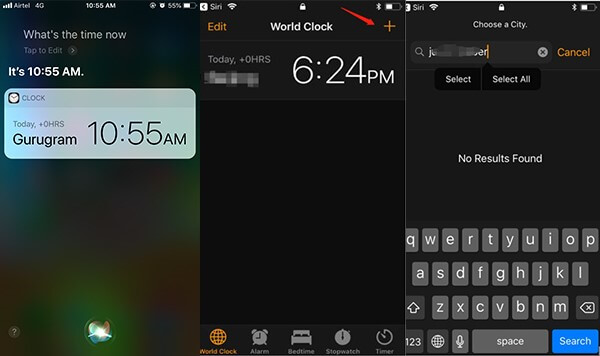
Step 3: You will find the option of the “Share” button soon. A pop-up opens after tapping on the button, which shows different options that can be accessed. Click on “Messages” to move to the next screen.
Step 4: Fill out the “To” box with some characters and click on “Return” on your keyboard. You need to press the Home button or swipe up according to your Apple iPhone 14 Pro model. The home page of your Apple iPhone 14 Pro will be accessed successfully.
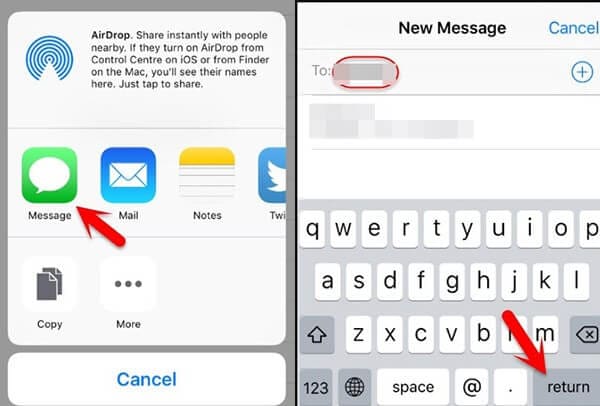
Pros
- The data across your Apple iPhone 14 Pro will not get erased with this process.
- You do not need to access any other third-party tool for unlocking your Apple iPhone 14 Pro.
Cons
- If you have a version of iOS except 3.2 and 10.3.3, you cannot use this method.
- This method is not applicable if Siri is not activated across your Apple iPhone 14 Pro.
Part 6: FAQs about iPhone Screen Lock
- How many counts do I have to unlock my iPhone?
You have around ten entries to unlock your Apple iPhone 14 Pro, after which the Apple iPhone 14 Pro device will be completely locked. After the 5th wrong entry, you are expected to wait for a minute until you try again. After the 10th wrong entry, the Apple iPhone 14 Pro device gets locked out and allows you to connect to iTunes.
- Is it possible to reset the Apple iPhone 14 Pro passcode with an Apple ID?
No, you cannot reset the Apple iPhone 14 Pro passcode using Apple ID. Both are different security measures and cannot reset one using another.
- What should I know about the screen time passcode?
Parental controls on iPhones use a different passcode to restrict content. It includes restricting things like privacy, game center, web content, explicit content, iTunes app and purchases. It is also known as a restriction passcode.
- Can Apple reset a forgotten iPhone passcode?
No, Apple cannot reset the forgotten iPhone passcode. However, they will help you with the steps to erase, reset, and recover the phone. You must prove yourself to be the Apple iPhone 14 Pro device owner, so keep the purchase receipt with you.
Conclusion
Human beings are clumsy, and they often forget passcodes to their devices. However, there is no need to panic as technology has progressed enough to offer loopholes in the situations. The article presented multiple methods to bypass iPhone passcode and steer clear of this mess. Some frequently asked questions were also answered regarding the Apple iPhone 14 Pro screen lock.
Easy Steps on How To Create a New Apple ID Account On Apple iPhone 14 Pro
Your Apple ID is your gateway to a world of apps and services, making it an essential part of your Apple experience. Whether you’re a new Apple user or simply looking to start fresh, creating a new Apple ID can open the doors to endless possibilities.
This guide will walk you through creating a new account for Apple devices in an easy-to-understand manner. From setting up your email address to securing your account, this article covered you every step of the way. Embark on this journey and learn how to create a new Apple ID account effortlessly.
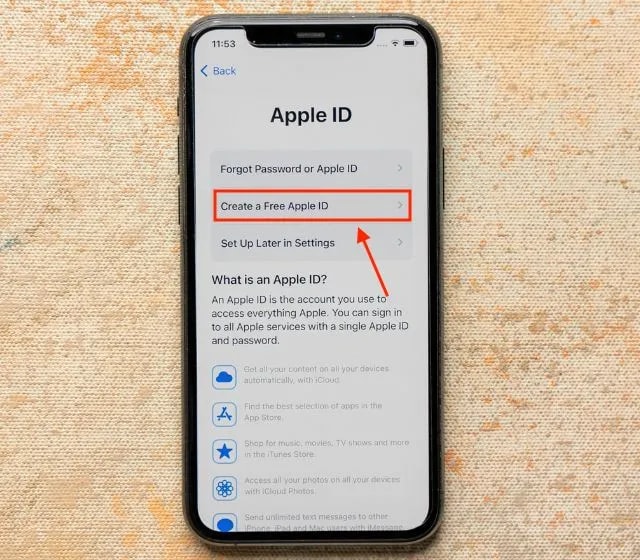
Part 1: Why Create a New Apple ID?
You might need to create a new Apple ID to enhance your Apple experience. Let’s dive into why it’s a good idea:
A. Reasons for Creating a New Apple ID Account
Here’s a breakdown of the reasons why you should create a new Apple ID for your Apple iPhone 14 Pro:
- Your Apple ID is like your digital identity. Creating a new one lets you choose a unique email address that suits you, adding a personal touch to your Apple journey.
- Maybe you’ve been using an email for your Apple ID that you don’t want to use anymore. Creating a new one helps keep your personal and Apple-related emails separate.
- **Switching Devices.**When you switch to a new Apple device, like getting a new iPhone or iPad, creating a unique Apple ID ensures a fresh start tailored to your new gadget.
- **Separation of Accounts.**Sometimes, you may want to keep your work-related apps and data separate from your ones. Creating a new Apple ID helps you achieve this separation.
- If you’re using Apple services for different purposes, such as work and personal use, having separate Apple IDs can help keep everything organized and distinct.
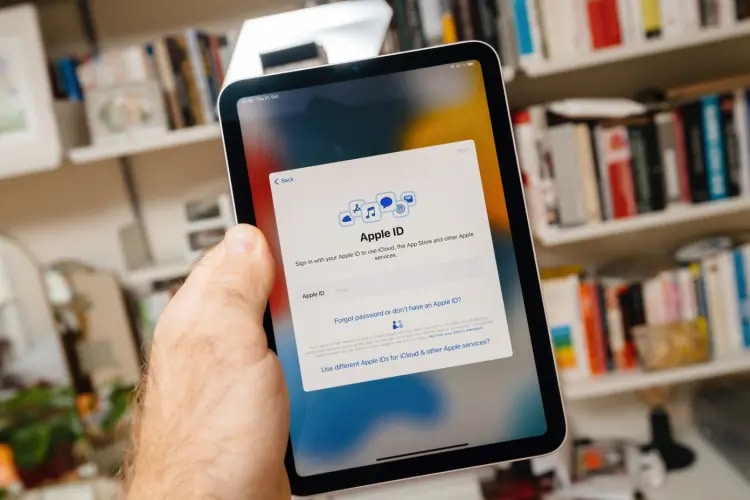
B. Scenarios Where a New ID Is Needed
Below are the common scenarios where a new Apple ID might be needed:
- **New Apple Device.**When you purchase a new Apple device, like an iPhone or iPad, you’ll need a new Apple ID to set it up and make it truly yours.
- **Shared Device.**If multiple people use the same device, creating a new Apple ID for each user ensures that everyone has their own personalized experience.
- **Change of Email.**If your current email address associated with your Apple ID is changed or you prefer a new one, creating a unique Apple ID with the updated email is the solution.
- **Work and Personal.**To keep your work-related apps and data separate from your personal ones, having separate Apple IDs for each purpose is practical and organized.
- **Starting Fresh.**Sometimes, you might want a fresh start with your Apple experience, and creating a new Apple ID provides a clean slate.
Creating a new Apple ID isn’t just about getting a new email; it’s about tailoring your Apple experience to your needs, whether for personalization, privacy, or organization. Now that you know why it’s essential, let’s explore how to create it in the next section.
Part 2: Step-by-Step Guide: How To Create a New Apple ID Account
Creating a new Apple ID for free is a straightforward process. Let’s break it down into simple steps:
A. Registering a New Apple ID
These are the steps for registering a new Apple ID:
- Step 1: Open your web browser and visit the Apple ID account management page. Click the Create Your Apple ID button to begin.
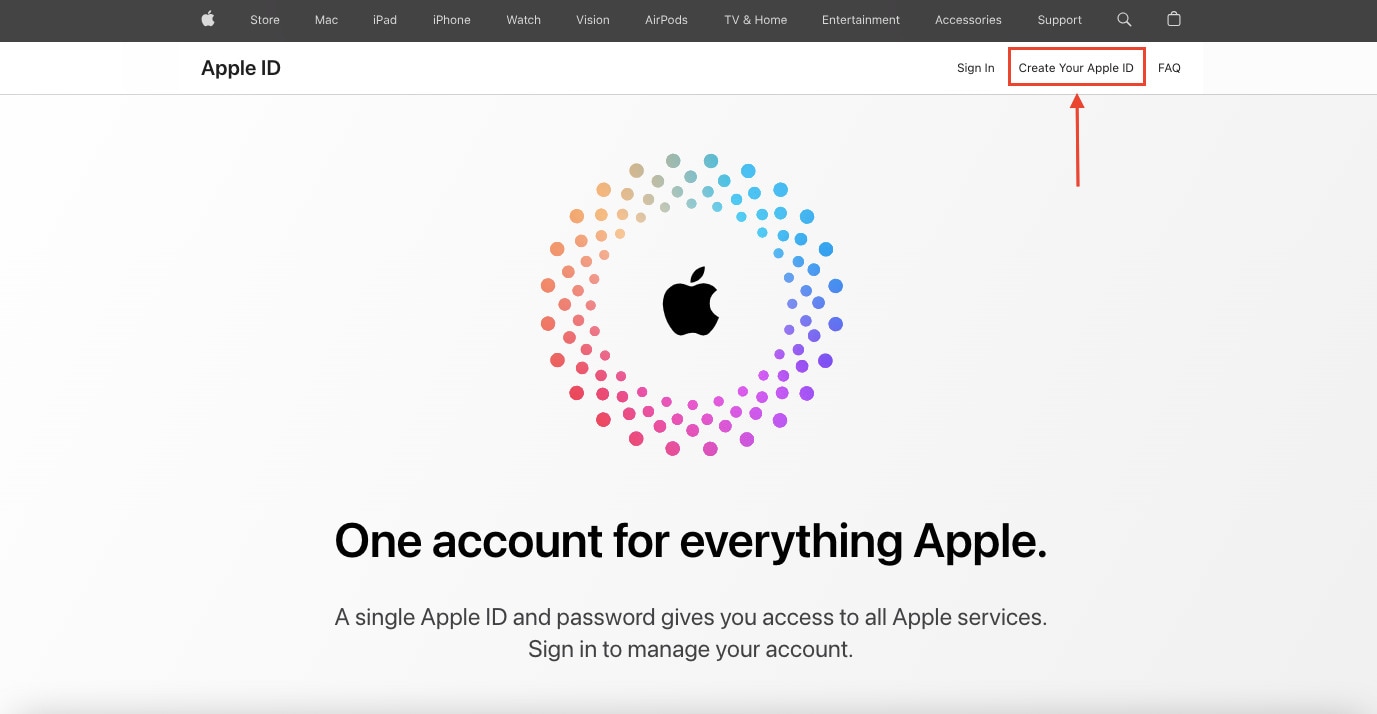
- Step 2: On the registration page, you’ll be asked to provide your First name and Last name. Make sure to use the name associated with your new Apple ID. Next, you’ll need to enter your preferred email address. This one will be your new Apple ID.
Tip: Choose an email that’s easy to remember and access.
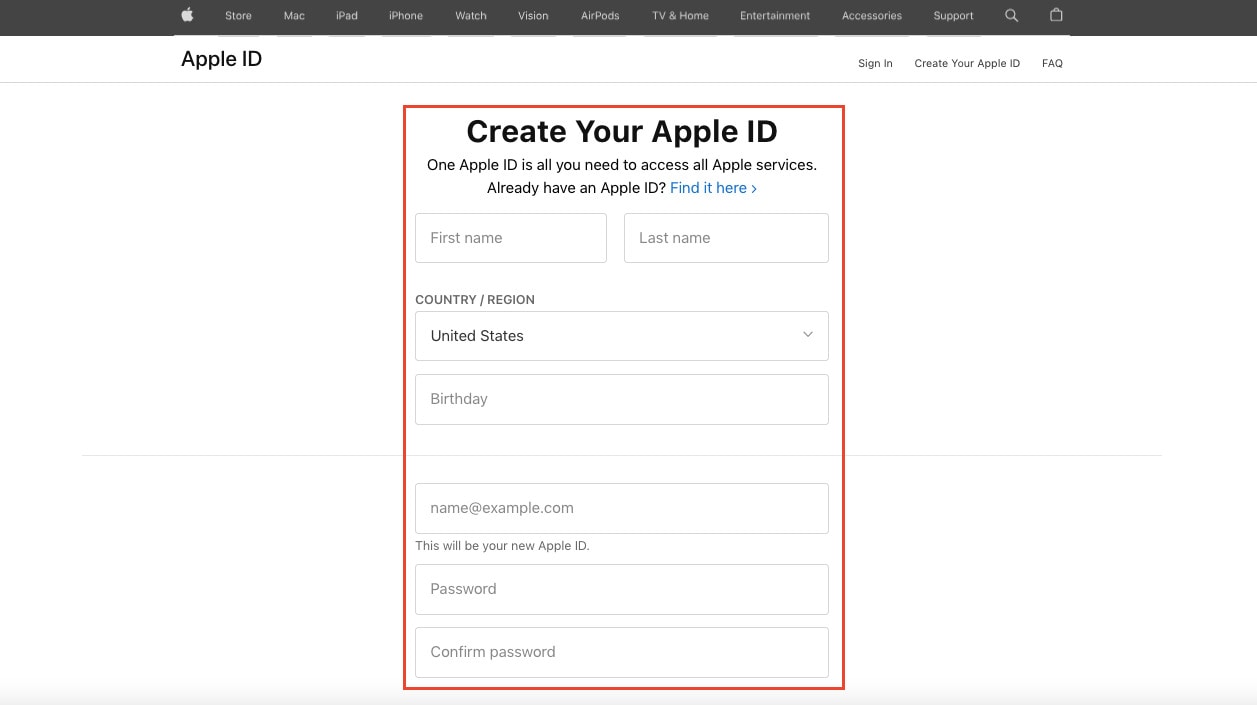
- Step 3: Create a strong password that combines letters, numbers, and symbols. This password is essential for the security of your account, so make it unique and hard to guess. Confirm your password by entering it again in the designated field.
B. Verifying Your Identity
The next step is verifying your identity. Check out the steps below:
- Step 4: Apple takes your security seriously. You may be asked to provide a phone number to verify your identity. This number can be used for account recovery or two-factor authentication. The phone number you provided will receive a verification code. Enter this code in the space provided to confirm your identity.
Note: It’s crucial to ensure that your phone number is accurate and accessible. This number will help you recover your account in case you forget your password or encounter any issues. Apple may use this phone number for two-factor authentication, adding an extra layer of security to your account.
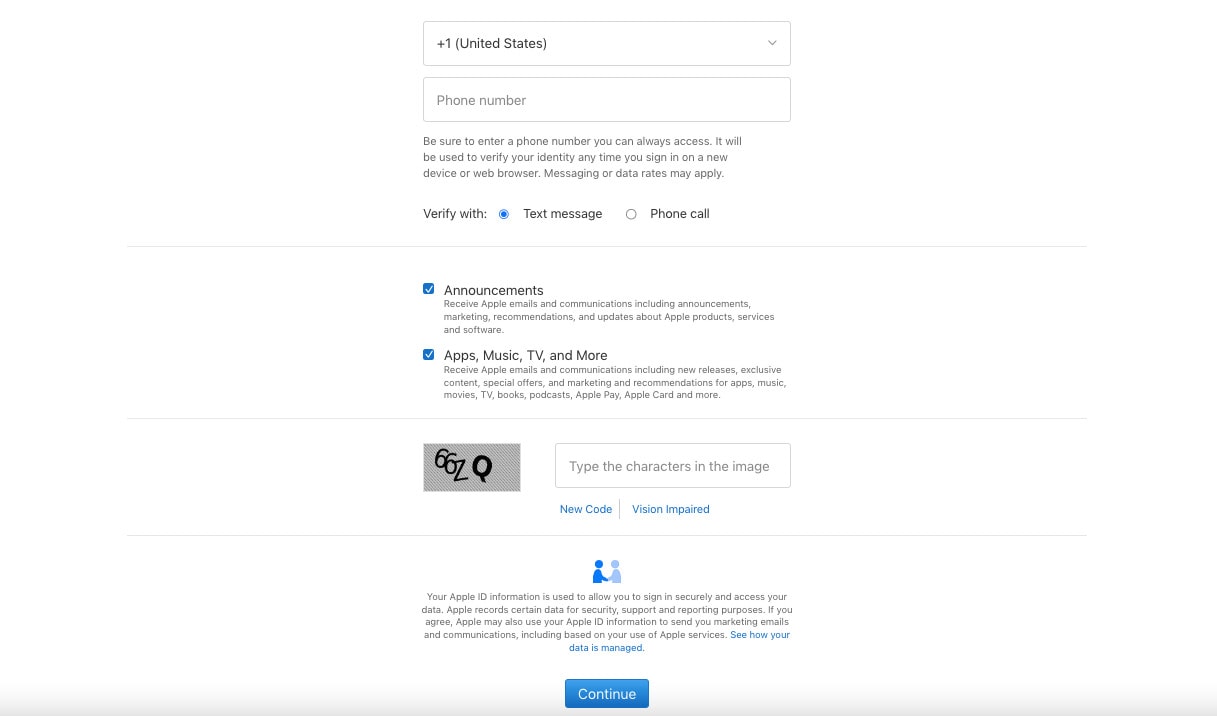
- Step 5: Apple may sometimes ask you to complete a CAPTCHA or verify your identity to prevent automated account creation.
C. Setting Up Security Questions
The next process will be setting up security questions for your account:
- Step 6: Apple asks you to choose and answer security questions. These questions provide an additional layer of protection for your account. Select questions that you can easily remember and that others can’t guess.
D. Finalizing the Process
To finalize the creation process, refer to the steps given below:
- Step 7: Read through Apple’s Terms and Conditions and Privacy Policy. Once you’ve understood them, tick the box to confirm that you’ve read and agree to the iCloud and Apple Media Services Terms and Conditions. Then click Agree to proceed. Remember that it’s essential to be familiar with Apple’s policies to ensure a secure and smooth experience.
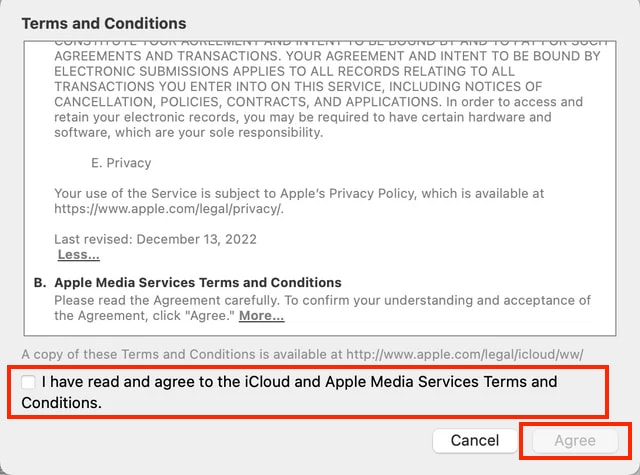
- Step 8: After completing these steps, Apple will send a confirmation email to the address you provided. Go to your email and open the verification link to confirm your new Apple ID.
Congratulations! You’ve successfully created a new Apple ID. With this account, you can now access Apple’s services, including the App Store, iCloud, and more. Remember to keep your login credentials secure and use them to personalize your Apple experience fully.
Part 3: Effortlessly Remove Your Apple ID Using Wondershare Dr.Fone - Screen Unlock (iOS)
You can embark on an enhanced Apple experience after successfully creating your new Apple ID. Removing the previous one is essential when you create it, especially if you’ve acquired a second-hand device or no longer want the previous user’s associated credentials.
This step ensures that your new Apple ID takes center stage, granting you full control over your device and its associated services. But if you encounter difficulties when removing the previous Apple ID from your device, Dr.Fone - Screen Unlock (iOS) is a reliable and user-friendly solution.
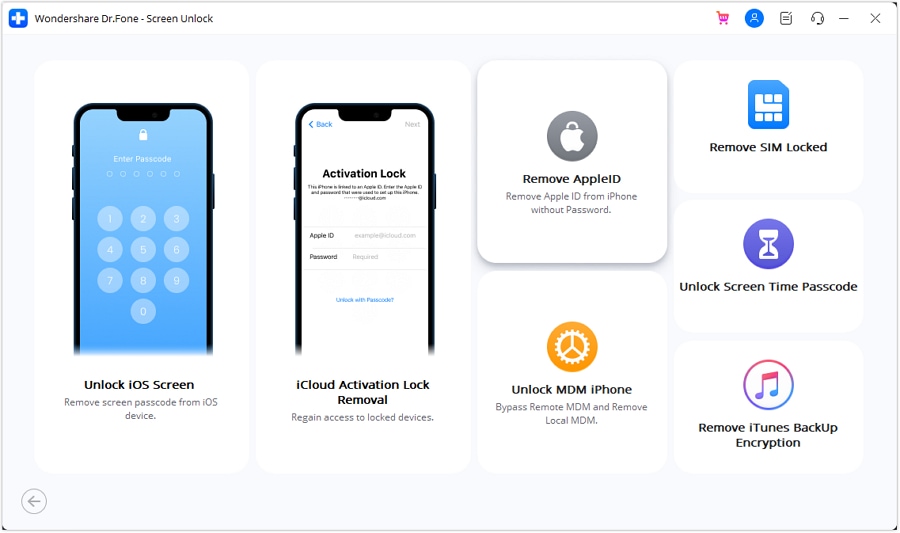
Key Features of Dr.Fone - Screen Unlock (iOS)
This versatile tool offers the following key features in the context of Apple ID issues:
- **User-Friendly Interface.**Fone - Screen Unlock (iOS) is designed to be straightforward, making it accessible to users of all levels of technical expertise.
- It is usable with a wide range of iOS devices, ensuring you can remove the previous Apple ID from your device, regardless of the model.
- **Multiple Unlock Modes.**Fone offers various unlock modes to cater to different scenarios, including removing the previous Apple ID. This flexibility ensures that you have the right solution for your specific situation.
- **Data Security.**Fone - Screen Unlock (iOS) prioritizes data security, ensuring that your personal information and content remain intact during the Apple ID removal process.
Step-by-Step Guide on Using Dr.Fone Screen Unlock (iOS)
Check out the steps on how to remove an Apple ID account using Dr.Fone below:
- Step 1: Launch Wondershare Dr.Fone on your PC to use the Screen Unlock function and then navigate to Toolbox. Click the Screen Unlock section, then choose iOS.

- Step 2: If you want to proceed with deleting your Apple ID, you’ll need to go to the next window and select the Remove AppleID option from the menu.
- Step 3: When you hook up your iOS device to a computer, the next screen will report on its connectivity. Select the Unlock Now button to proceed.
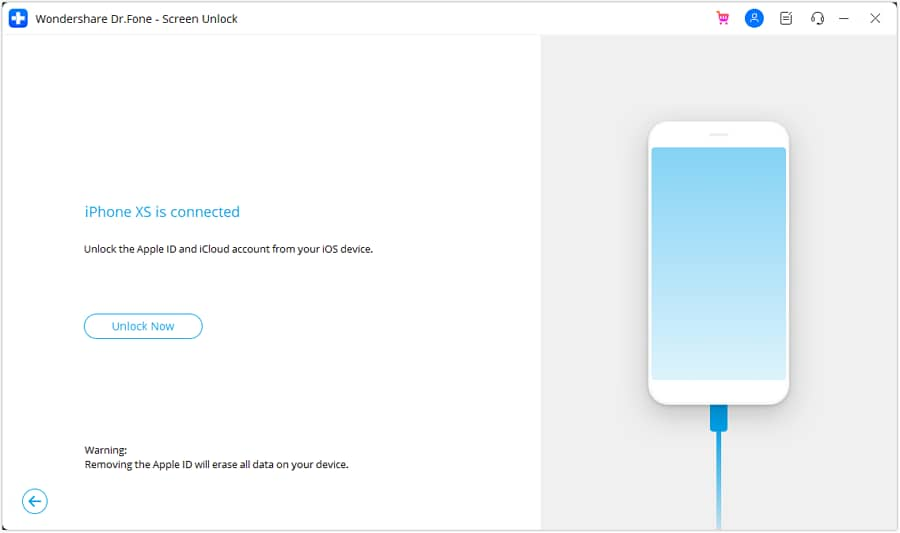
- Step 4: Before the Apple ID can be unlocked, the next step is for the platform to ask a series of questions. Verify that a screen lock is active on your iOS device. However, please lock your iOS device before proceeding with the Yes option.
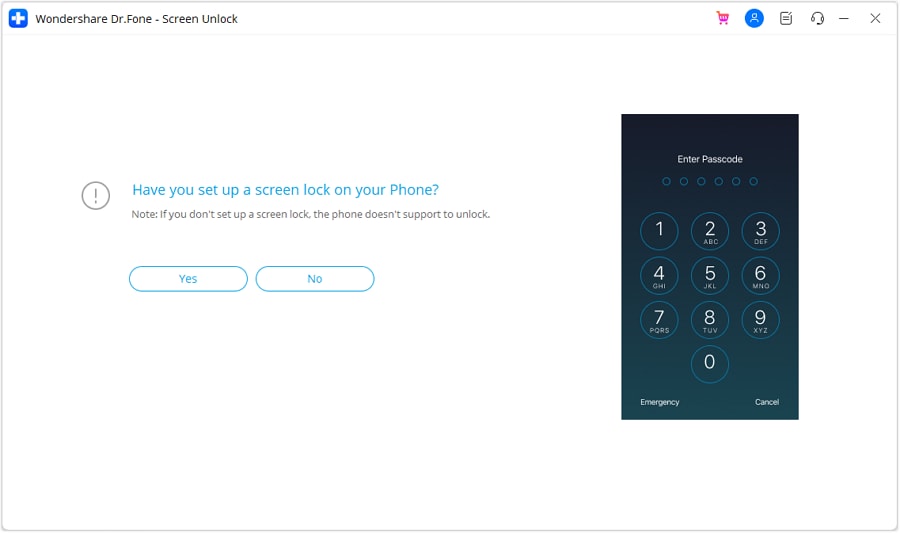
- Step 5: Check if Two-Factor Authentication is set up on all your iOS devices. If not, switch it on before confirming your decision to unlock your Apple ID.
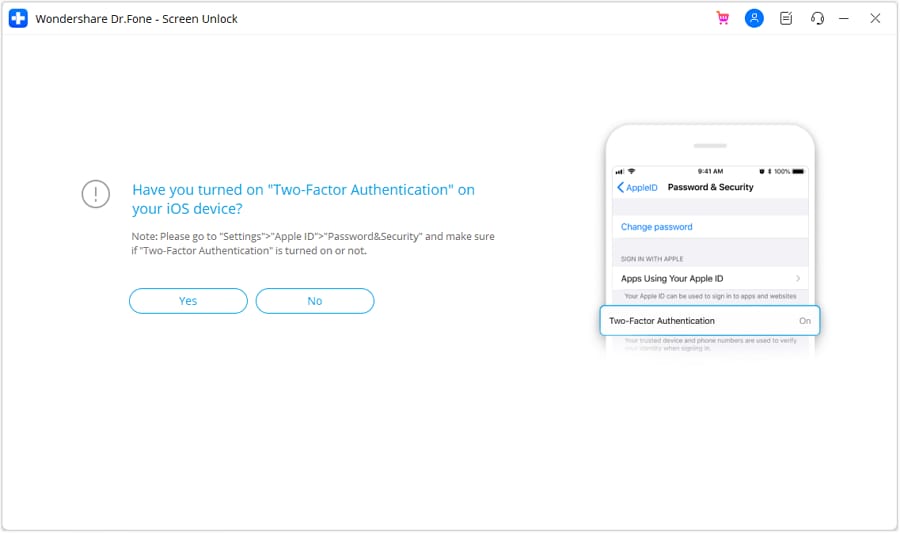
- Step 6: After you have confirmed these settings, you will be taken to a screen with on-screen instructions for entering Recovery Mode on your iDevice. If the steps for your specific iOS device don’t work, try tapping Try DFU Mode in the app’s bottom left corner. To continue with the unlocking process, this will launch the DFU Mode instructions.
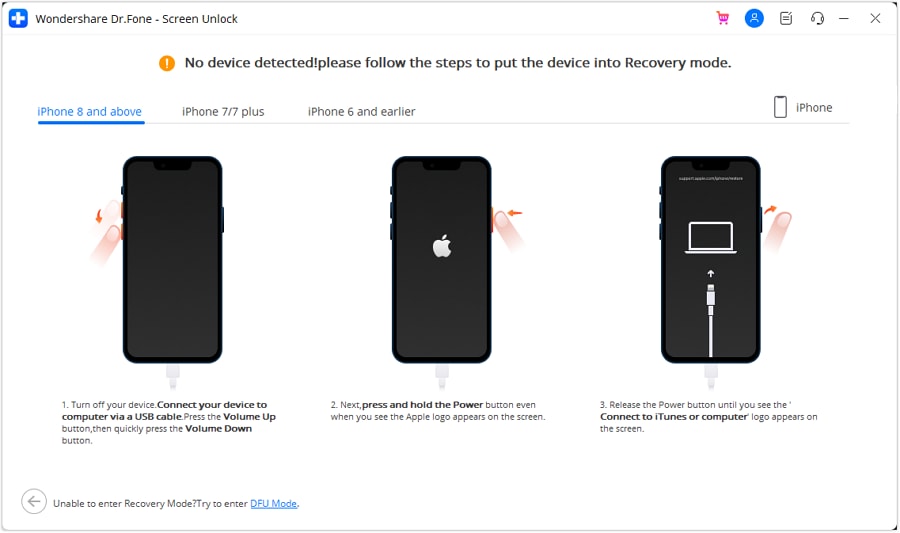
- Step 7: Once Recovery Mode has been activated, the Apple iPhone 14 Pro device’s information will be shown on the subsequent screen. Once the Device Model has been identified, all that remains is to choose the appropriate System Version and click Start. However, if there are disagreements in recognition, pick the details by hand and move forward.
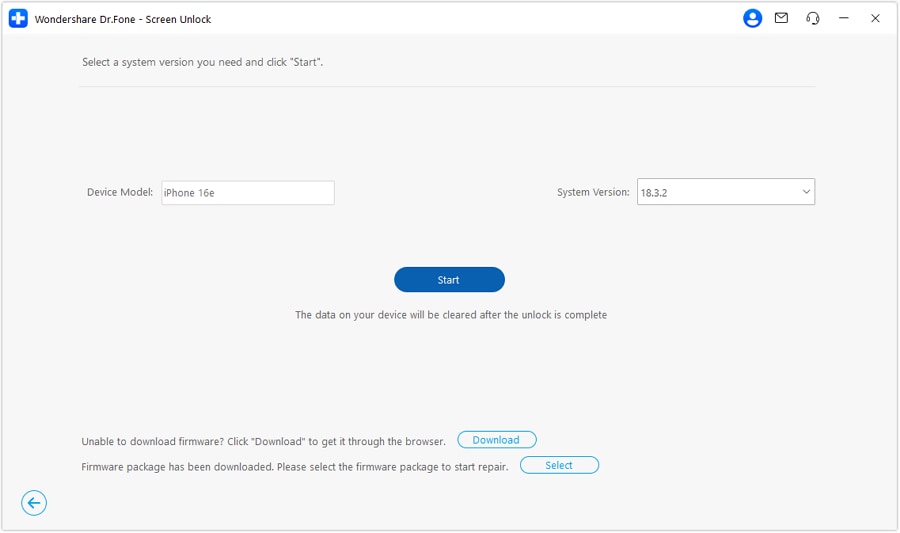
- Step 8: The appropriate iOS firmware begins downloading, showing its status on the following screen. Click the Copy button to copy the direct URL to download iOS firmware for systems with sluggish firmware download speeds.
- Step 9: The platform checks the downloaded firmware and displays its details on the following screen. To proceed with unlocking your Apple ID, click the Unlock Now button. To proceed, you will be prompted to input a code into a confirmation window. Enter the code and then click the Unlock button.
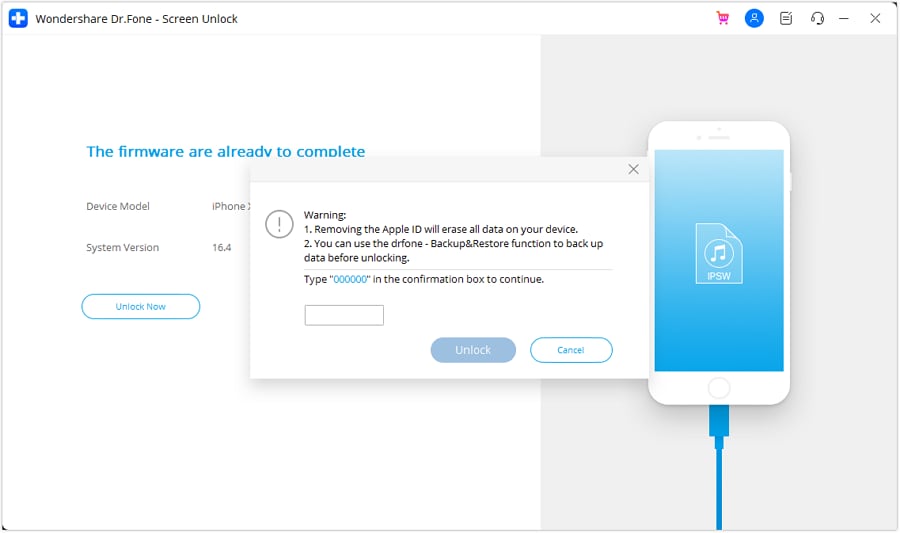
- Step 10: The following screen shows the unlocking status of your Apple ID. Don’t let the Apple iPhone 14 Pro device lose its connection under any circumstances. The screen prompts the process of completing the Apple ID once the ID has been unlocked. If the Apple ID has been unlocked, click Done to proceed. If that fails, click the Try Again button and give it another shot.
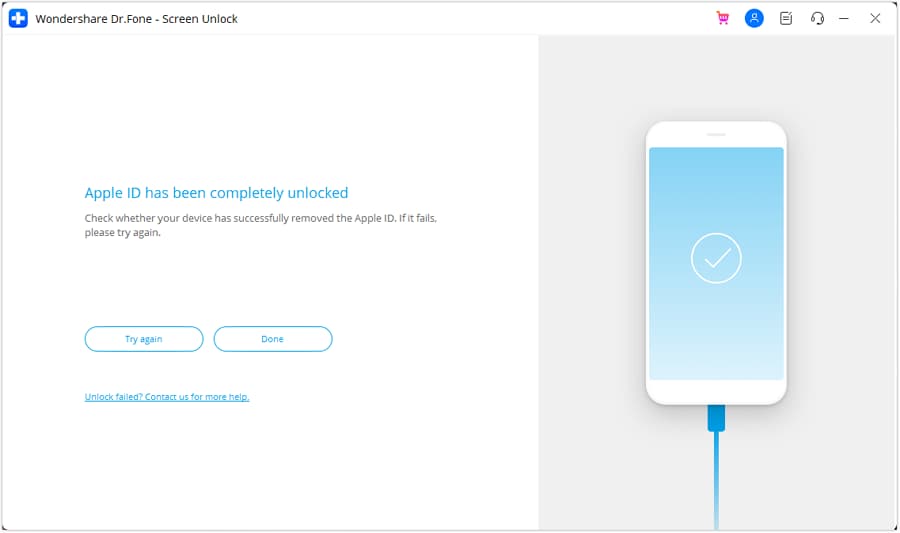
Conclusion
This guide has simplified the process of creating a new Apple ID, ensuring you can effortlessly personalize, secure, and organize your digital experience. Creating a new Apple ID is easy, and it allows you to tailor your Apple journey to your preferences. Remember, it’s all about you, your privacy, and your convenience.
Should you encounter any challenges while managing your Apple ID, such as removing a previous one, consider Dr.Fone - iOS Screen Unlock tool. This user-friendly resource stands ready to assist, ensuring a seamless and secure Apple experience. Explore the possibilities and make the most of your Apple adventure!
Resolve Your Apple iPhone 14 Pro Keeps Asking for Outlook Password
Individuals and organizations use a diverse range of mail platforms to exchange information. Gmail, Outlook, or any alternative service is consistently utilized. While email platforms have revolutionized communication, they aren’t present without their challenges. Users often encounter issues that range from sync errors to authentication problems.
Among these challenges, iPhone users specifically grapple with a persistent issue. It often appears as “iPhone keeps asking for Outlook password.” This issue disrupts the user experience and raises security concerns. To address this problem, this guide presents a detailed guide featuring effective fixes.

Part 1. Why Does My iPhone Keep Asking for Outlook Password
The iPhone asking for Outlook password arises from a combination of factors. Understanding these reasons is crucial in diagnosing and resolving the problem effectively:
1. Incorrect Password Entry
Users might unknowingly enter the wrong password. They may have changed their Outlook password without updating it on their iPhones. This mismatch can trigger continuous password prompts.
2. Outdated Mail App
An outdated Outlook mail app on your Apple iPhone 14 Pro may struggle to communicate with its latest security protocols. This can lead to performance issues like the Apple iPhone 14 Pro keeps asking for passwords.
3. Network Connectivity Issues
Upholding a stable internet connection is necessary for effortless communication. An unreliable or unstable network can disrupt the synchronization process in Outlook.
4. Corrupted Email Account Profile
A corrupted email account profile on the Apple iPhone 14 Pro can cause disruptions during the authentication process. Resetting the email account on the Apple iPhone 14 Pro device might be necessary to resolve the issue.
5. Third-Party App Interference
Other mail applications installed on the Apple iPhone 14 Pro can also cause an issue. They might interfere with the Outlook app’s proper functioning. Identifying and temporarily disabling such apps can help diagnose and resolve the issue.
6. Excessive Email Fetching
Configuring the Outlook mail app to fetch emails too frequently causes the issue. It can strain the connection with Outlook servers, leading to authentication challenges. That causes issues like the Apple iPhone 14 Pro asking for a password.
7. iOS Software Glitches
The smooth functioning of the Mail app may be disrupted by problems and malfunctions present in the iOS software. Compatibility issues could emerge if your device is not operating on the latest iOS version.
Part 2. [Fixes] Solve iPhone/iPad Keeps Asking for Outlook Password
Now that we have explored why the iPad keeps asking for an Outlook password, it is time for practical solutions. These 13 fixes discussed below are designed to address the root causes comprehensively:
Fix 1. Add Password Once and Let the Prompt Disappear
If your Apple iPhone 14 Pro continuously prompts you for the Outlook password, a simple solution is to re-enter the password. Follow these steps to potentially resolve the issue once and for all by accessing the respective settings:
- Step 1. You begin by accessing your iDevice’s “Settings” app and scrolling down to tap the “Mail” option. Next, press “Accounts,” and on the following screen, select the Outlook account.

- Step 2. Encountering the error message “Account not authenticated” is what you will come across. Now, tap the “Re-enter Password” option to enter your correct Outlook password.

Fix 2. Change the Password to Your Outlook Mail
Sometimes, the email service provider may force users to change their passwords for security reasons. There is a chance that it is why your iPhone asks for an Outlook password. To modify your Outlook password from the desktop platform, adhere to the following steps:
- Step 1. Open your preferred web browser and go to the Outlook login page. Sign in to your Outlook account, locate, and click on your profile picture in the upper-right corner. There, click “My Profile,” and on the next screen, tap “Change Password” near the upper right corner.

- Step 2. Upon reaching the verification page, provide your password and tap the “Sign In” button. Afterward, you will be asked for other verification methods. Upon verifying, the “Change your password” window will appear. Here, you will need to enter your “Current password,” “New password,” and re-enter it to proceed. Then, hit the “Save” button, and your password will be changed.

Fix 3. Checking the Network Connection
Network inconsistencies can often disrupt the authentication process. This can be the leading cause behind persistent password prompts. To ensure a stable connection, ensure that you are connected to a reliable and stable Wi-Fi network. You can also try toggling the Wi-Fi and mobile data switches on and off.
Another way to confirm if network errors are the problem is to try enabling Airplane Mode. After a while, disable the Airplane Mode and check if the issue is resolved.

Fix 4. Using the Mail Toggle as a Remedy
A strategic approach to resolving authentication issues involves using the Mail toggle. You can use it to disable and re-enable the email services. This action essentially resets the Outlook app’s connection and can be performed as follows:
- Step 1. Within your Apple iPhone 14 Pro’s “Settings” app, scroll down and tap “Mail.” On the following screen, press “Accounts” and choose the “Outlook” account.

- Step 2. Here, you will find the toggle switch for “Mail.” Now, turn off the email service and wait for a few moments. Toggle the switch back on to re-enable the email service.

Fix 5. Delete and Re-Insert Outlook Account
Deleting and re-inserting your Outlook account on your Apple iPhone 14 Pro can provide a fresh start to the email integration. Follow these steps if the persistent iPhone keeps asking for an Outlook password:
- Step 1. Navigate to the “Mail” tab within the “Settings” app on your Apple iPhone 14 Pro, and choose “Accounts” to observe the roster of email accounts. Here, tap on your Outlook account, and the following screen, press “Delete Account.”

- Step 2. Once you have deleted the account, return to the “Accounts” tab. Select “Outlook.com” after tapping on “Add Account.” Now, follow the on-screen instructions to re-enter your account details.

Fix 6. Re-Check Sync Settings
Ensuring that your sync settings align with Outlook’s recommended configurations is crucial. Follow these steps to re-check and adjust your sync settings on your Apple iPhone 14 Pro:
- Step 1. After accessing the “Mail” tab within the Settings app, tap “Accounts.” Here, find and choose the “Fetch New Data” option, followed by selecting the “Outlook” account.

- Step 2. Confirm that the “Push” or “Fetch” settings are configured to your preference. “Push” enables real-time updates, while “Fetch” allows you to set specific intervals for email updates.

Fix 7. Uninstall and Re-Install Outlook App
Is the Outlook app generally showing a lot of glitches on your Apple iPhone 14 Pro? If yes, uninstalling and then re-installing it can address potential “iPhone**/iPad keeps asking for Outlook password”** issues:
Instructions: On your Apple iPhone 14 Pro’s home screen, navigate to the Outlook mail app. Long-press the Outlook app icon and choose “Remove App” from the pop-up menu. Then, tap “Delete App” and follow it by pressing “Delete” to uninstall the app. Afterward, access the App Store and download the Microsoft Outlook app again.

Fix 8. Update iOS From Settings
Outdated iOS versions can contribute to compatibility issues and glitches. This can affect the proper functioning of the Mail app and its integration with Outlook. Follow these steps to ensure your iOS is up to date:
Instructions. Access your device’s “General” settings from the Settings app. Tap “Software Update” on the next screen and check if an update is available. Tap “Install Now” to kick-start the iOS updating process if an update is available. Make sure your device is adequately charged and maintains a stable internet connection.
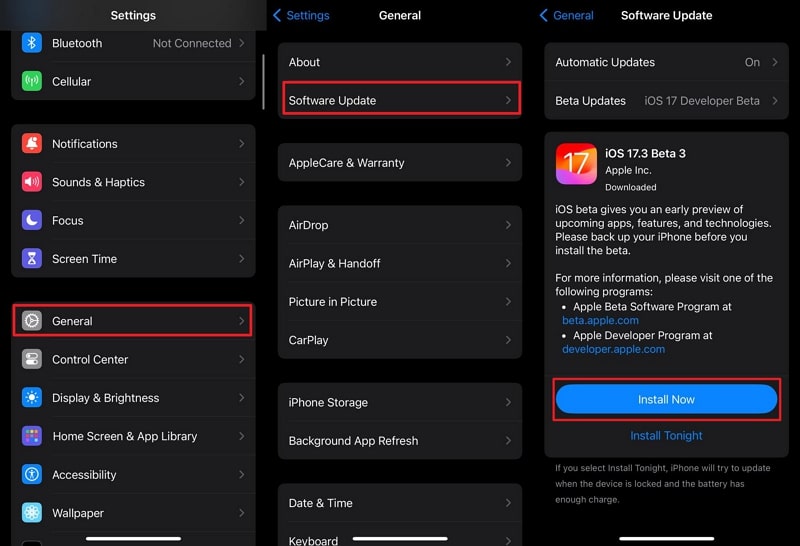
Fix 9. Try Other Alternatives to Outlook
Exploring alternative mail applications may offer a viable workaround. This is especially true if the iPhone asking for the Outlook password proves resistant to previous solutions. Consider using other email platforms such as Apple Mail, Gmail, and Yahoo Mail. This solution might not directly resolve the issue with Outlook. Yet, an alternative can provide a temporary workaround until a solution is found.
=

Fix 10. Try Disabling Privacy Protection
Certain privacy protection features on your Apple iPhone 14 Pro may interfere with the integration of Outlook. To troubleshoot this, consider temporarily disabling privacy protection settings:
Instructions. On your Apple iPhone 14 Pro, access “Mail” settings through the Settings application. Now, scroll down to find and tap the “Privacy Protection” option in the “Messages” section. Next, you will come across the “Protect Mail Activity” switch. Here, toggle off the switch to check if it is resolved.

Fix 11. Reset All Settings of the iPhone
If the persistent password prompts remain unresolved, resetting all settings on your Apple iPhone 14 Pro can be the solution. It acts as a comprehensive solution to potential configuration issues. This action does not erase your data but resets system settings to default. To reset all settings on your Apple iPhone 14 Pro, you can follow these steps:
- Step 1. Navigate to the “General” tab in the “Settings” app on your Apple iPhone 14 Pro after you open it. Move down the screen, and at the bottom, choose “Transfer or Reset iPhone.”

- Step 2. On the following screen, tap “Reset” and select “Reset All Settings” from the available options. Enter your device passcode if prompted and confirm the action by selecting “Reset All Settings” again.

Fix 12. Add an Account by Switching to IMAP
In some cases, switching the account type to IMAP during the setup process can help resolve issues. For many users, it has worked to resolve issues related to Outlook password prompts. Follow these steps to add your Outlook account using the IMAP protocol:
- Step 1. Begin by accessing the “Settings” app on your Apple iPhone 14 Pro, then scroll down to locate and tap on “Mail.” Within this section, choose “Accounts” to display the roster of email accounts, and proceed to tap on “Add Account.”

- Step 2. Choose “Other” as the account type and select “Add Mail Account.” Enter your Name, full Outlook email address, descriptive description, and unique password, and hit “Next.”

- Step 3. Utilize the specified settings for the “Incoming Mail Server” and “Outgoing Mail Server” sections under the “IMAP” tab:
Incoming Mail Server
Hostname: imap-mail.outlook.com
Username: Your full Outlook email address
Password: Your Outlook password
Outgoing Mail Server
Hostname: smtp-mail.outlook.com
Username: Your full Outlook email address
Password: Your Outlook password
At last, hit the “Next” button at the top-right side of the screen.

Fix 13. Contact Support of Outlook To Resolve
If none of the previous fixes resolve the issue, seek help directly from Outlook Support. Outlook’s support is capable of addressing a broad spectrum of issues. It is adept at delivering personalized assistance tailored to your circumstances.
Bonus Part. Can’t Access Outlook Because iPhone Is Locked? A Quick Solution
The iPhone keeps asking for an Outlook password, which isn’t the only password-related problem. Forgetting the screen locks of their iPhones is a common phenomenon. It is especially prevalent among iPhone users. You can no longer access important Outlook emails when your Apple iPhone 14 Pro is locked. That is where Wondershare Dr.Fone emerges as your savior. This powerful tool can bypass all types of iOS screen locks within minutes.
It can remove lock screens on your Apple iPhone 14 Pro, iPad, and iPod. You can say goodbye to the hassle of dealing with iCloud activation locks. Moreover, it helps remove your Apple ID if you have forgotten your Apple ID password. Dr.Fone allows you to bypass them effortlessly without requiring a password.
Prime Features of Wondershare Dr.Fone
- It can circumvent Mobile Device Management and screen time restrictions without data loss.
- This tool completely supports the most recent iOS 17, iPadOS 17, and iPhone 15.
- Additionally, this software effortlessly bypasses carrier locks on your Apple iPhone 14 Pro.
Steps To Unlock Your Apple iPhone 14 Pro via Wondershare Dr.Fone
Unlocking your Apple iPhone 14 Pro using Wondershare Dr.Fone is a straightforward process. That is made possible with its intuitive interface and a simple 3-step procedure. You can use the following steps to bypass your Apple iPhone 14 Pro’s screen lock within minutes:
- Step 1: Access Screen Unlock by Launching Dr.Fone
Once you’ve launched Dr.Fone on your computer, go to Toolbox. Here, tap “Screen Unlock” and choose “iOS.” In the opened window, choose the “Unlock iOS Screen” option to unlock your iOS device’s screen. On the subsequent screen, click “Start” to commence the iOS device unlocking process.
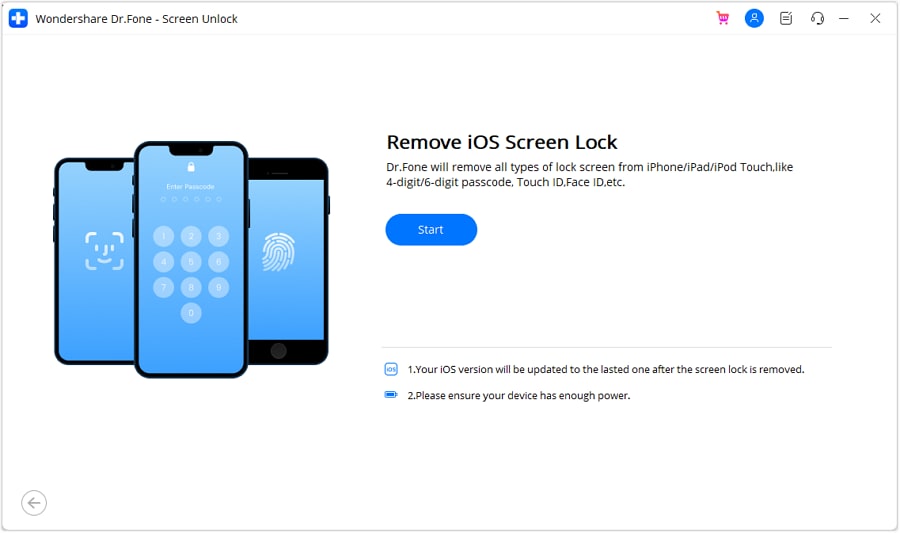
- Step 2: Initiating iPhone Recovery Mode and Device Identification
Subsequently, you need to place your Apple iPhone 14 Pro into Recovery Mode. Adhere to the on-screen instructions corresponding to the model of your iDevice. Afterward, the tool will automatically detect the “Device Model.” If necessary, adjust the model and choose the “System Version.” Once these steps are completed, click “Start” to initiate the unlocking process.

- Step 3: Finalizing iOS Device Unlock
Monitor the iOS firmware download progress on the screen. After successful download and verification, proceed by selecting “Unlock Now.” A confirmation window will appear, prompting you to input the necessary code. Enter the code and tap Unlock to proceed to the outcome. Upon unlocking the iDevice, click the “Done” button to finalize the process.
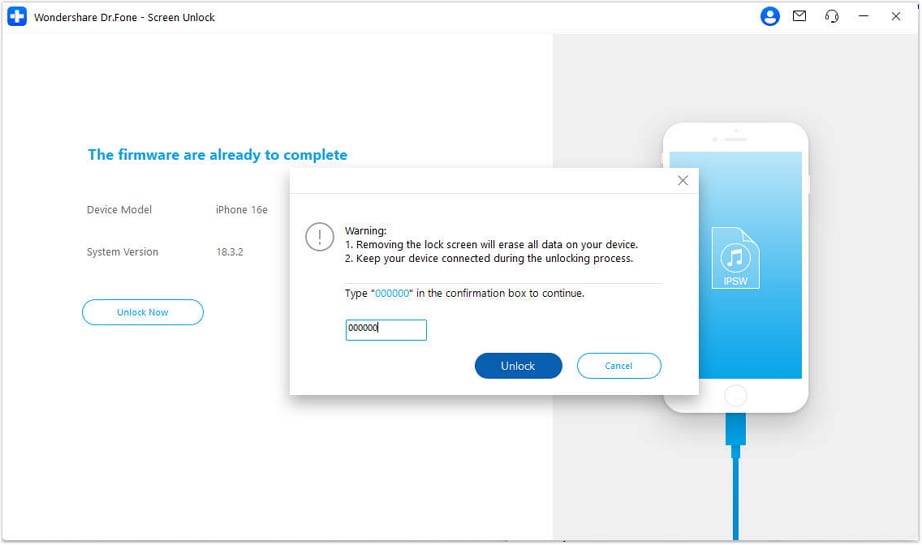
Conclusion
To summarize, resolving an iPhone asking for an Outlook password requires a systematic approach. From re-entering passwords to adjusting settings, this guide has covered 13 comprehensive fixes. For those facing the challenge of a locked iPhone, Dr.Fone offers a reliable solution. Users can ensure integration between their iPhones and Outlook by addressing these issues. This will enhance their overall email experience.
Tips: Are you searching for a powerful Screen Unlock tool? No worries as Dr.Fone is here to help you. Download it and start a seamless unlock experience!
Also read:
- 2024 Approved Into the Depths Mastering GoPro's Time-Lapse Techniques
- Catch or Beat Sleeping Snorlax on Pokemon Go For Apple iPhone 15 Pro Max | Dr.fone
- Hassle-Free Ways to Remove FRP Lock on Infinix Note 30 VIP Racing Edition Phones with/without a PC
- How To Unlock A Found Apple iPhone X? | Dr.fone
- In 2024, Exploring the Limits Full Potential of ScreenFlow v4 on macOS
- In 2024, How to Make the Most of Your iPhone XR Lock Screen with Notifications? | Dr.fone
- In 2024, How to Turn Off Find My Apple iPhone X when Phone is Broken? | Dr.fone
- In 2024, Locked Out of iPhone 14 Plus? 5 Ways to get into a Locked iPhone 14 Plus | Dr.fone
- In 2024, PassFab Apple iPhone 7 Backup Unlocker Top 4 Alternatives | Dr.fone
- Platform Picker Optimal Content on Youtube or TikTok, In 2024
- Streamlining Social Interaction via Multi-View Broadcasting in Facebook for 2024
- The Ultimate Guide to Top Cloud Stores on Android for 2024
- Top Locations for Obtaining Email Addresses: Discover the Ideal Sources with MassMail Software
- Unlocking Apple iPhone XS Max Passcode without a Computer | Dr.fone
- Updated In 2024, Level Up Your Video Editing with 20 Free Adobe Premiere Intro Templates
- Title: How to Unlock iPhone 14 Pro Passcode Screen? | Dr.fone
- Author: Amelia
- Created at : 2024-11-11 19:06:34
- Updated at : 2024-11-17 11:34:39
- Link: https://iphone-unlock.techidaily.com/how-to-unlock-iphone-14-pro-passcode-screen-drfone-by-drfone-ios/
- License: This work is licensed under CC BY-NC-SA 4.0.